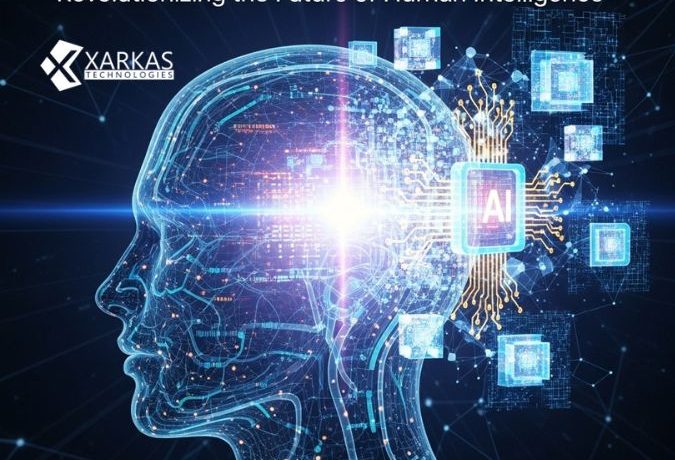
Intelligent AI: Revolutionizing the Future of Human Intelligence
In today’s era of digital transformation, Intelligent Artificial Intelligence (AI) stands as the cornerstone of modern innovation. It has evolved far beyond traditional automation, becoming a cognitive entity capable of reasoning, learning, and decision-making. From enhancing healthcare to transforming business analytics, intelligent AI is revolutionizing industries, reshaping human potential, and paving the way for a more interconnected world.
Table Of Content
- What Is Intelligent AI?
- Key Components of Intelligent AI
- 1. Machine Learning and Deep Learning
- 2. Natural Language Processing (NLP)
- 3. Computer Vision
- 4. Cognitive Computing
- Applications of Intelligent AI Across Industries
- 1. Healthcare Transformation
- 2. Finance and Banking
- 3. Education and Learning
- 4. Manufacturing and Automation
- 5. Smart Cities and IoT
- The Role of Intelligent AI in Business Growth
- Ethical and Security Challenges of Intelligent AI
- Future Trends in Intelligent AI
- Why Intelligent AI Is the Future
What Is Intelligent AI?
Intelligent AI refers to advanced artificial intelligence systems that can analyze, learn, adapt, and make independent decisions. Unlike basic machine learning algorithms that rely on predefined instructions, intelligent AI continuously evolves by understanding new data patterns, predicting outcomes, and optimizing performance.
At its core, intelligent AI integrates machine learning (ML), deep learning (DL), natural language processing (NLP), and neural networks to simulate human-like intelligence. This enables systems to comprehend context, recognize emotions, and even generate creative outputs — all without explicit programming.
Key Components of Intelligent AI
1. Machine Learning and Deep Learning
Machine Learning forms the backbone of intelligent AI, enabling systems to learn from data and improve performance over time. Deep Learning, a subset of ML, employs multi-layered neural networks to process complex data structures such as images, speech, and text. This combination empowers AI to achieve human-level accuracy in recognition and prediction tasks.
2. Natural Language Processing (NLP)
NLP allows AI systems to understand, interpret, and respond to human language naturally. It powers chatbots, virtual assistants, and translation systems, bridging the gap between humans and machines. Advanced NLP models can understand semantics, tone, and context, enabling intelligent AI to engage in meaningful conversations.
3. Computer Vision
Through computer vision, intelligent AI can analyze and interpret visual information from the world around it. This capability is vital in autonomous vehicles, facial recognition systems, and medical imaging, where precision and real-time analysis are critical.
4. Cognitive Computing
Cognitive computing simulates human thought processes in a computerized model. It leverages AI, reasoning, and contextual awareness to solve complex problems in a human-like way. This component allows intelligent AI to make informed decisions, assess risk, and adapt strategies dynamically.
Applications of Intelligent AI Across Industries
1. Healthcare Transformation
Intelligent AI is driving a revolution in healthcare by enhancing diagnostics, drug discovery, and patient care. Algorithms can detect early signs of diseases such as cancer, analyze X-rays with superior accuracy, and suggest personalized treatment plans. AI-powered virtual health assistants provide round-the-clock patient support, while predictive analytics improve hospital efficiency.
2. Finance and Banking
The financial sector has embraced intelligent AI for fraud detection, risk management, and automated trading. By analyzing millions of transactions in real time, AI identifies anomalies that indicate potential fraud. Furthermore, intelligent chatbots provide 24/7 customer assistance, and AI-driven investment platforms deliver smarter portfolio management.
3. Education and Learning
Intelligent AI enables personalized learning experiences by adapting content based on each student’s pace and performance. Virtual tutors, intelligent grading systems, and content recommendation engines are transforming how students and educators interact. It fosters inclusive education by supporting students with diverse learning abilities.
4. Manufacturing and Automation
In the manufacturing industry, intelligent AI ensures predictive maintenance, quality assurance, and supply chain optimization. By analyzing sensor data, AI predicts equipment failures before they occur, minimizing downtime. Robotics powered by intelligent AI work collaboratively with humans, increasing productivity and safety.
5. Smart Cities and IoT
Smart cities rely on intelligent AI to manage traffic systems, reduce energy consumption, and enhance public safety. AI-powered surveillance detects unusual activities, while IoT devices integrated with intelligent algorithms optimize resource distribution. This creates sustainable and efficient urban ecosystems.
The Role of Intelligent AI in Business Growth
Businesses leveraging intelligent AI gain a competitive edge through data-driven insights, process optimization, and customer engagement. AI automates routine tasks, enabling employees to focus on innovation and creativity. By harnessing predictive analytics, companies can forecast market trends, improve decision-making, and increase profitability.
Moreover, AI-powered marketing tools analyze consumer behavior to deliver personalized campaigns, enhancing customer satisfaction and loyalty. From logistics to HR management, intelligent AI fosters efficiency, accuracy, and scalability across business operations.
Ethical and Security Challenges of Intelligent AI
Despite its advantages, intelligent AI raises ethical and security concerns that cannot be ignored. Issues such as data privacy, algorithmic bias, and job displacement demand urgent attention. Ensuring that AI systems are transparent, explainable, and fair is crucial for maintaining trust.
Cybersecurity is another major concern. As AI systems become more autonomous, they may also become targets for malicious attacks. Implementing AI governance frameworks and ethical guidelines will be essential for balancing innovation with responsibility.
Future Trends in Intelligent AI

The future of intelligent AI points toward human-AI collaboration, where machines enhance human creativity rather than replace it. Advancements in quantum computing and neuromorphic engineering will further accelerate AI’s learning capabilities, enabling real-time processing of massive datasets.
Key emerging trends include:
- Generative AI for creative content production
- Explainable AI (XAI) for transparent decision-making
- Edge AI for faster, decentralized computing
- AI-driven robotics for autonomous operations
As these technologies mature, intelligent AI will become deeply embedded in every aspect of our lives — from personal assistants to global problem-solving systems.
Why Intelligent AI Is the Future
Intelligent AI represents more than technological progress — it signifies the dawn of a new era of intelligence where machines think, learn, and evolve alongside humans. Its impact will reshape industries, redefine economies, and transform how we live and work.
By adopting intelligent AI responsibly, humanity can unlock endless possibilities — from curing diseases to solving climate challenges. It is not just about smarter machines but about creating a smarter world.
In conclusion, Intelligent AI is not the future; it is the present, actively redefining innovation and human capability. Embracing it with foresight, ethics, and creativity will ensure that it serves as a force for good across all domains of life.






No Comment! Be the first one.